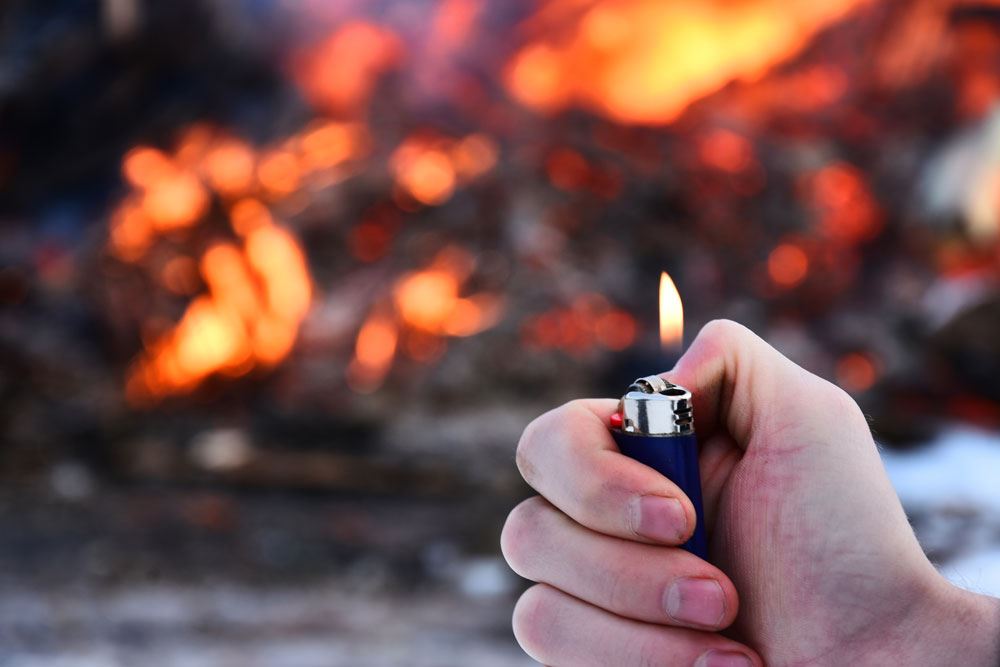Although most people understand that “arson” is when someone sets a fire, there are three different degrees of arson in SC with graduated, or increasing, penalties based on the severity of the offense.
Each type of arson also includes important definitions and built-in defenses – if the prosecution cannot prove each and every element of the arson charge beyond any reasonable doubt, your case could be dismissed, or you could be acquitted by a jury at trial.
In this article you will learn:
- What the different degrees of arson are in SC,
- The elements that the State must prove to get a conviction, and
- The potential penalties if you are convicted of first, second, or third-degree arson.
Arson in South Carolina
What’s the difference between 1st, 2nd, and 3rd degree arson in SC?
Arson, in the simplest terms, is where a person starts a fire or causes an explosion. As we’ll discuss in more detail below, 1st degree arson is when that fire or explosion causes death or serious bodily injury to a person, regardless of the location of the fire or explosion.
If there is no serious injury or death and if there was only property damage, the person could be charged with either 2nd or 3rd degree arson depending on the location of the fire or explosion.
To qualify as any degree of arson, the fire or explosion must cause some type of damage, no matter how slight. Also, it doesn’t matter if the property belongs to you or someone else – you can be convicted of arson for setting fire to your own property.
The 3 Degrees of Arson Charges in SC
Damage is defined as any “burning, charring, blistering, scorching, smoking, singeing, discoloring, or changing the fiber or composition of” a property.
“Dwelling house” is another term that must be defined, as it may be an element of 1st or 2nd degree burglary.
Dwelling house includes outhouses or sheds that are “appurtenant to” a home, and is defined by SC law as “any house, outhouse, apartment, building, erection, shed or box in which there sleeps a proprietor, tenant, watchman, clerk, laborer or person who lodges there with a view to the protection of property,” or “houses, outhouses, buildings, sheds and erections which are within two hundred yards of it and are appurtenant to it or to the same establishment of which it is an appurtenance.”
Why does it matter?
As we discuss below, arson 2nd degree carries a significantly higher penalty than arson 3rd degree, and the difference could turn on whether the structure involved was a dwelling house.
1st Degree Arson
The elements of 1st degree arson – each of which must be proven beyond a reasonable doubt before the state can get a conviction – include:
- A willful and malicious intent,
- The person causes an explosion, sets fire to, burns, or causes to be burned, or aids, counsels or procures a burning,
- The explosion or fire results in damage (see definition of damage above) to a building, structure, or any type of property listed below under the elements of 2nd and 3rd degree arson, and
- The explosion or fire results in death or serious bodily injury – directly or indirectly.
2nd Degree Arson
The elements of 2nd degree arson – each of which must be proven beyond a reasonable doubt before the state can get a conviction – include:
- A willful and malicious intent,
- The person causes an explosion, sets fire to, burns, or causes to be burned, or aids, counsels or procures a burning,
- The explosion or fire results in damage (see definition of damage above) to a dwelling house, church, school facility, manufacturing plant or warehouse, business, institutional facility, or any structure designed for human occupancy.
3rd Degree Arson
The elements of 3rd degree arson – each of which must be proven beyond a reasonable doubt before the state can get a conviction – include:
- A willful and malicious intent,
- The person causes an explosion, sets fire to, burns, or causes to be burned, or aids, counsels or procures a burning, and
- The explosion or fire results in damage (see definition of damage above) to any building not covered under the 1st or 2nd degree statutes, or a railcar, ship, boat, watercraft, aircraft, motor vehicle, or personal property.
Penalties for Arson in SC
Arson is one of the most serious crimes there is under SC law – all degrees of arson are felony offenses, arson 1st degree carries a mandatory minimum sentence of thirty years, arson 2nd degree carries a mandatory minimum sentence of three years, and a conviction for 1st degree arson carries the same penalty as a conviction for murder:
| Charge | Felony or Misdemeanor | Potential Prison Sentence |
| 1st degree arson | Felony | Mandatory minimum sentence of 30 years up to life in prison |
| 2nd degree arson | Felony | Mandatory minimum sentence of three years and up to 25 years in prison |
| 3rd degree arson | Felony | Up to 15 years in prison |
Questions About Arson in SC?
Your criminal defense lawyers at Templeton, Mims & Ward understand that, if you are charged with arson in SC, you are fighting for your freedom, your family, and your life – this is not a minor misdemeanor offense that results in a fine or 30 days in jail.
If you have been charged with 1st, 2nd, or 3rd degree arson in SC, contact the SC criminal defense attorneys at Templeton, Mims & Ward at (843) 891-6100 or by sending us an email through our website to set up a consultation and find out how we can help.






